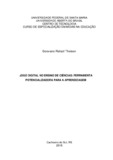| dc.contributor.advisor | Silva, Luís Alvaro de Lima | |
| dc.creator | Theisen, Geovane Rafael | |
| dc.date.accessioned | 2019-05-27T14:41:09Z | |
| dc.date.available | 2019-05-27T14:41:09Z | |
| dc.date.issued | 2018-12-21 | |
| dc.date.submitted | 2018 | |
| dc.identifier.uri | http://repositorio.ufsm.br/handle/1/16667 | |
| dc.description | Artigo (especialização) - Universidade Federal de Santa Maria, Centro de Tecnologia, Curso de Especialização em Mídias na Educação, EaD, RS, 2018. | por |
| dc.description.abstract | This article describes a research using digital game in order to rescue the interest and motivation of the students by the science discipline and to encourage them in the construction of knowledge. The work is characterized as a descriptive study of the case study type, with a qualitative approach. The research participants are Elementary School students from a municipal school in Santa Maria, Rio Grande do Sul, Brazil. According to the methodology adopted, students in the computer lab were challenged to use an online interface of a digital game, where a cell model was presented. In this environment, students should click, drag and fit the name of each cell organelle in the indicated arrow. The feedback was immediate and constant, since the features of the game only allowed the student to choose the correct word to describe the cellular organelle. After completing the game, the students drew up a drawing with the cell and its structures as a way to fix the activity. It was possible to observe during the task, the concentration and enthusiasm of the students. However, some have experienced difficulties in using the technology, which is due to the fact that they do not have access to the technology in their residences. However, it is possible to verify that with the digital inclusion in the school, the chaining of the tasks according to the player / student's ability does not only cover the cognitive bias, but directly affects the motivation of the learner to continue the learning process. In conclusion, the analysis of the data obtained in the research allows us to verify characteristics that signal a possible meaningful learning through this methodology. | eng |
| dc.language | por | por |
| dc.publisher | Universidade Federal de Santa Maria | por |
| dc.rights | Acesso Aberto | por |
| dc.rights | Attribution-NonCommercial-NoDerivatives 4.0 International | * |
| dc.rights.uri | http://creativecommons.org/licenses/by-nc-nd/4.0/ | * |
| dc.subject | Jogo digital | por |
| dc.subject | Ensino de ciências | por |
| dc.subject | Célula animal | por |
| dc.subject | Digital games | eng |
| dc.subject | Science education | eng |
| dc.subject | Animal cell | eng |
| dc.title | Jogo digital no ensino de ciências: ferramenta potencializadora para a aprendizagem | por |
| dc.title.alternative | Digital games in science teaching: potential tool for learning | eng |
| dc.type | Trabalho de Conclusão de Curso de Especialização | por |
| dc.degree.local | Polo de Cachoeira do Sul, RS, Brasil | por |
| dc.degree.specialization | Mídias na Educação, EaD | por |
| dc.description.resumo | Este artigo descreve uma pesquisa utilizando jogo digital com o intuito de resgatar o interesse e a motivação dos estudantes pela disciplina de ciências e incentivá-los na construção do conhecimento. O trabalho caracteriza-se como um estudo descritivo do tipo estudo de caso, com abordagem qualitativa. Os participantes da pesquisa são alunos do Ensino Fundamental de uma escola municipal de Santa Maria, Rio Grande do Sul, Brasil. De acordo com a metodologia adotada, os alunos, no laboratório de informática, foram desafiados a utilizar uma interface online de um jogo digital, onde um modelo de célula foi apresentado. Neste ambiente, os alunos deveriam clicar, arrastar e encaixar o nome de cada organela da célula na seta indicada. O feedback era imediato e constante, visto que os recursos do jogo somente permitiam que o aluno escolhesse a palavra correta para descrever a organela celular. Após a conclusão do jogo, os estudantes elaboraram um desenho com a célula e suas estruturas como forma de fixar a atividade. Foi possível observar durante a tarefa, a concentração e entusiasmo dos discentes. Contudo, alguns apresentaram dificuldades no uso da tecnologia, o que se deve ao fato de não disporem de acesso à tecnologia em suas residências. Entretanto, é possível verificar que com a inclusão digital na escola, o encadeamento das tarefas em função da habilidade do jogador/estudante não abarca somente o viés cognitivo, mas afeta de forma direta na motivação do aprendiz em continuar o processo de aprendizagem. Em conclusão, a análise dos dados obtidos na pesquisa permite verificar características que sinalizam uma possível aprendizagem significativa por meio dessa metodologia. | por |
| dc.publisher.country | Brasil | por |
| dc.publisher.initials | UFSM | por |
| dc.subject.cnpq | CNPQ::CIENCIAS HUMANAS::EDUCACAO | por |
| dc.publisher.unidade | Centro de Tecnologia | por |



